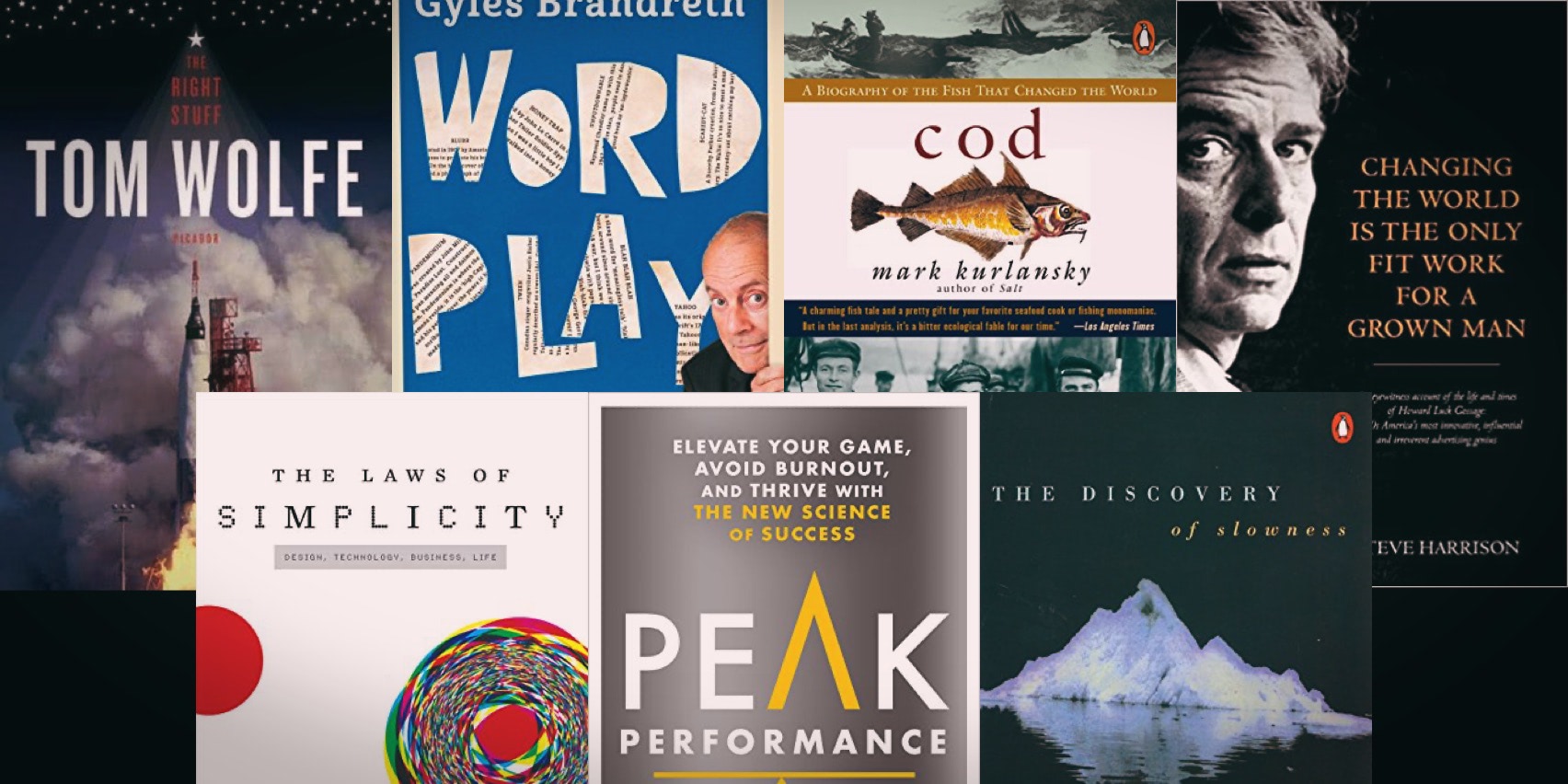2022 started off, well… I think the LA Times summed it up best: “First pandemic. Then recession. Now, Russia invades Ukraine. Anything else, world?”
For me, 2022 was a year of coping.
My goal was to work less, live more, and I think I actually did it.
- Started a podcast.
- Started rock climbing.
- Played more video games.
- Enjoyed time with family and friends.
My goal for 2023: keep living, keep playing.
Happy New Year.
Jump to: Personal, Books, Music, Code
Personal
Starting a Podcast
Remember when I wanted to write a book? Well, I’m still doing that—still researching, still scratching notes that don’t exactly fit together. But now I’m also doing this.
Long story short, I wanted to talk to people, so I started a podcast. And guess what I named it?
Catching Up With Web Performance
That’s right, I used the same name as the book, same website, same silly logo that looks like a botched Chick Fil-A sign, and just ran with it.
It takes a lot to edit, transcribe, etc., but it’s fun, I love it, and I’ve been lucky to meet a ton of really great people.
🤞 Here’s hoping for more in 2023.
Researching Web Performance
I’m a sucker for history. I can’t stop myself going down rabbit holes—it’s the stuff I find interesting (whether it’s interesting to other people, who knows).
So while I’ve been spelunking in statistics and operations research, I finally wrangled together a rough history (more like genealogy) of web performance and published the first part in this year’s Web Performance Calendar:
An Incomplete History of Web Performance
Again, who knows if this is interesting to other people—it’s definitely not practical. But for me at least, it’s building a foundation for everything else I want to talk about: purpose, principles, and practice. Slowly but surely, the pieces are coming together.
Letting Go of Everything Else
I started this year thinking I’d maintain my open source projects.
😞 Sadly, I haven’t.
Part of me feels ashamed—but honestly the rest of me feels relieved. I know it sucks (and I realize I should find new maintainers for these projects) but it’s a huge relief for me to not worry about them. Raising a family, I don’t have much spare time to begin with. And when I want to work on projects as big as a book or a podcast, I just can’t.
So I’ve been letting go.
👋 If you’re interested in maintaining one of these projects, email [email protected]:
- Snap Slider – JavaScript plugin to manage sliders using CSS Scroll Snap.
- Match Height – JavaScript plugin to make different elements the same height.
- Twitter Print Styles – Chrome extension for adding simple print styles to save Twitter threads as PDFs.
- GitHub Wiki Search – Chrome extension for adding a simple search box to GitHub wikis.
Family
My kids are growing up fast—year of big emotions! Between ski school, school crushes, and finding out I’m the real tooth fairy, it’s been a big year.
The kids are making breakfast on their own, getting awards at school, reading graphic novels, asking me about money and how we pay our mortgage.
They’re also getting into computers, learning about usernames, passwords, and the difference between a physical mailing address and email. (I swear, computers are so hard to explain.)
Speaking of, Brianne’s finally teaching again. Now that we’re past peak COVID, she’s teaching preschool—and boy, those lucky kids. She’s like Ms. Frizzle for three-year-olds. “Did you know you can walk on eggs without breaking them?! Let’s try it!”
Next year we’ll have even more stories to tell.
Books
-
 The Right Stuffby Tom Wolfe
The Right Stuffby Tom Wolfe I laughed, cried, couldn’t believe—such an incredible story, as only Tom Wolfe could tell it.
The test pilots who became America’s first astronauts: Project Mercury.
Manly Courage in the Face of Physical Danger:
- “Naturally, this was never mentioned, either. Yet there it was. Manliness, manhood, manly courage… there was something ancient, primordial, irresistible about the challenge of this stuff, no matter what a sophisticated and rational age one might think he lived in.”
Pushing the Envelope:
- “One of the phrases that kept running through the conversation was ‘pushing the outside of the envelope.’ The ‘envelope’ was a flight-test term referring to the limits of a particular aircraft’s performance, how tight a turn it could make at such-and-such a speed, and so on. ‘Pushing the outside,’ probing the outer limits, of the envelope seemed to be the great challenge and satisfaction of flight test.”
The Unwritten Protocol:
- “Like many other wives in Group 20 Jane wanted to talk about the whole situation, the incredible series of fatal accidents, with her husband and the other members of the Group, to find out how they were taking it. But somehow the unwritten protocol forbade discussions of this subject, which was the fear of death.”
Punching Out:
- “In the era of jet fighters, ejection meant being exploded out of the cockpit by a nitroglycerine charge, like a human cannonball. The ejection itself was so hazardous—men lost knees, arms, and their lives on the rim of the cockpit or had the skin torn off their faces when they hit the ‘wall’ of air outside—that many pilots chose to wrestle their aircraft to the ground rather than try it… and died that way instead.”
- “Yeager had always figured it was useless to try to punch out of a rocket plane. Crossfield called it ‘committing suicide to keep from getting killed.’”
Chuck Yeager:
- “Anyone who travels very much on airlines in the United States soon gets to know the voice of the airline pilot… That particular voice may sound vaguely Southern or Southwestern, but it is specifically Appalachian in origin. It originated in the mountains of West Virginia, in the coal country, in Lincoln County, so far up in the hollows that, as the saying went, ‘they had to pipe in daylight.’ In the late 1940’s and early 1950’s this up-hollow voice drifted down from on high, from over the high desert of California, down, down, down, from the upper reaches of the Brotherhood into all phases of American aviation. It was amazing. It was Pygmalion in reverse. Military pilots and then, soon, airline pilots, pilots from Maine and Massachusetts and the Dakotas and Oregon and everywhere else, began to talk in that poker-hollow West Virginia drawl, or as close to it as they could bend their native accents. It was the drawl of the most righteous of all the possessors of the right stuff: Chuck Yeager.”
The Sound Barrier:
- “The speed of sound, Mach 1, was known (thanks to the work of the physicist Ernst Mach) to vary at different altitudes, temperatures, and wind speeds. On a calm 60-degree day at sea level it was about 760 miles an hour, while at 40,000 feet, where the temperature would be at least sixty below, it was about 660 miles an hour. Evil and baffling things happened in the transonic zone, which began at about .7 Mach. Wind tunnels choked out at such velocities. Pilots who approached the speed of sound in dives reported that the controls would lock or ‘freeze’ or even alter their normal functions. Pilots had crashed and died because they couldn’t budge the stick. Just last year Geoffrey de Havilland, son of the famous British aircraft designer and builder, had tried to take one of his father’s DH 108s to Mach 1. The ship started buffeting and then disintegrated, and he was killed. This led engineers to speculate that the shock waves became so severe and unpredictable at Mach 1, no aircraft could survive them. They started talking about ‘the sonic wall’ and ‘the sound barrier.’”
The J.C. Maneuver:
- “Inertia coupling nearly killed Kit Murray in 1954, when he set an altitude record of 94,000 feet in the X–IA, and it had hit Joe Walker twice, once in the XF–102 and again in the X–3. When he talked about it, Joe Walker would say he got out of it each time through ‘the J.C. maneuver.’ He’d say: ‘In the J.C. maneuver you take your hands off the controls and put the mother in the lap of a super-na-tu-ral power.’ And, in fact, that was the only choice you had.”
- “Walker was strapped into the X–IA, under the bomb bay of a B–29, at 35,000 feet, seventy seconds from launch, when a fuel tank exploded in the rear of the rocket plane. Walker got out, climbed back up into the B–29, passed out from lack of oxygen, was revived by a ‘walkaround’ oxygen bottle, went back down into the burning X–IA, and tried to jettison the rest of the fuel so as to prevent both ships, the X–IA and the B–29, from burning up. The rocket plane was finally dropped, like a bomb, over the desert.”
Spam in a Can:
- “A monkey’s gonna make the first flight. That was what you started hearing. Astronaut meant ‘star voyager,’ but in fact the poor devil would be a guinea pig for the study of the effects of weightlessness on the body and the central nervous system.”
- “The Mercury capsule was not a ship but a can. Not only did it involve no flying, there wasn’t even a window to look out of. There wasn’t even a hatch you could egress from like a man; it would take a crew of swabbos with lug wrenches to get you out of the thing. It was a can.”
- “The astronaut’s task is actually more like a radar observer’s job than a pilot’s.”
Computers:
- “It was only thanks to a recent invention, the high-speed electronic computer, that Project Mercury was feasible at all. There was an analogy here with the great Admiral of the Seas himself, Columbus. It was only thanks to a recent invention of his day, the magnetic compass, that Columbus had dared to sail across the Atlantic.”
From “Capsule” to “Spacecraft”:
- “The seven men pressed on. They were tired of the designation of ‘capsule’ for the Mercury vehicle. The term as much as declared that the man inside was not a pilot but an experimental animal in a pod. Gradually, everybody began trying to work the term ‘spacecraft’ into NASA publications and syllabuses.”
Urine on Launch Day:
- “No one had seriously studied the possibility that on the day itself, the day of the first American manned space flight, the astronaut might end up on top of the rocket and stuffed into the capsule with his legs practically immobile for more than four hours… with his bladder to answer to… Shepard waited for another stop in the countdown… and he announced his problem over the closed radio circuit. He said he wanted to relieve his bladder. Finally they told him to go ahead and ‘do it in the suit.’ And he did.”
The Precreated Experience:
- “Hundreds of times! Even if he had been ordered at that point to broadcast to the American people a detailed description of precisely what it felt like to be the first American riding a rocket into space, and even if he had had the leisure to do it, he could not possibly have expressed what he was feeling. For he was introducing the era of precreated experience. His launching was an utterly novel event in American history, and yet he could feel none of its novelty. He could not feel ‘the awesome power’ of the rocket beneath him, as the broadcasters kept referring to it. He could only compare it to the hundreds of rides he had taken on the centrifuge at Johnsville. The memory of all those rides was imbedded in his nervous system.”
- “Glenn knew he was weightless. From the instrument readings and through sheer logic he knew it, but he couldn’t feel it, just as Shepard and Grissom had never felt it… Awe seemed to be demanded, but how could he express awe honestly? He had lived it all before the event. How could he explain that to anybody?”
- “The world demanded awe, because this was a voyage through the stars. But he couldn’t feel it. The backdrop of the event, the stage, the environment, the true orbit… was not the vast reaches of the universe. It was the simulators. Who could possibly understand this?”
The Single-Combat Warrior:
- “By now, three months after his flight, John had ascended to a status that only a biblical scholar could fully appreciate. John was the triumphant single-combat warrior.”
- “Next to John Kennedy himself, John Glenn was probably the best-known and most admired American in the world.”
The Press Conference:
- “For the astronaut the flight consisted of riding the rocket and, God willing, not fucking up. For the wife the flight consisted of… the Press Conference.”
- “By now, when the other wives came around to the house of the Wife during a flight, they were not there to hold her hand over the dangers her husband was facing. They were there to hold her hand over the television cameras she would be facing.”
The End of an Era:
- “Maybe the age of ‘the flyboys,’ the stick’n’rudder fighter jocks, was about finished. All of that Yeager could accept. On the great pyramid there was no steady state. Sixteen years ago, when he came to Muroc, he was only twenty-four, and few other test pilots had ever heard of him, and most people in aviation thought ‘the sound barrier’ was as solid as a wall. Once he flew Mach 1, however, it was a whole new ball game. And now there were cosmonauts and astronauts, and it was a whole new ball game once again.”
- “Never again would an astronaut be perceived as a protector of the people, risking his life to do battle in the heavens. Not even the first American to walk on the moon would ever know the outpouring of a people’s most primal emotions that Shepard, Cooper, and, above all, Glenn had known. The era of America’s first single-combat warriors had come, and it had gone, perhaps never to be relived.”
-
 Word Playby Gyles Brandreth
Word Playby Gyles Brandreth Delightful! Great fun, from A to Z and back. I’m now a huge fan of malaphors, malaprops, and spoonerisms.
“If teachers taught, why didn’t preachers praught? Why is a boxing ring square? Why do people recite at a play and play at a recital? Why do we have noses that run and feet that smell? It’s very confusing, isn’t it?”
Word Trivia:
- “About 25 per cent of adults have vocabularies no larger than 12,000 words.”
- “Just two words, ‘I’ and ‘you’, represent 10 per cent of all informal conversation.”
- “The English word with the most individual meanings is set. The Oxford English Dictionary lists 430 separate definitions for set. And set also sets the record for the longest entry in the dictionary at 60,000 words.”
- “The Book of Esther is also the only book in the Bible in which God’s name is not mentioned.”
- “In the eighteenth century, there was a British racehorse called Potoooooooo. This was pronounced potatoes, made up from pot and eight os.”
- “In sign language, tongue twisters are known as finger fumblers.”
- “Guinea pigs aren’t pigs and don’t come from Guinea. India ink comes from China. Turkeys come from North America, not Turkey. And blindworms aren’t blind: they are legless lizards that can see.”
Word Play:
- “Incomprehensible is an anagram of problem in Chinese.”
- “Immanuel Kant But Kubla Khan.”
- “Oscar Was Wilde But Thornton Was Wilder.”
- “I’m not crazy about reality, but it’s still the only place to get a decent meal.”
- “A verbal contract isn’t worth the paper it’s written on.”
- “A nod is as good as a wink to a blind horse.”
- “Let’s have some new clichés.”
- “I can read him like the back of my book.”
- “We could stand here and talk until the cows turn blue.”
- “Don’t trust him. He’s a wolf in cheap clothing.”
- “If the circumstances were on the other foot.”
- “Half the lies our opponents tell about us are not true.”
- “I don’t like it. When you open that Pandora’s box, you will find it full of Trojan horses.”
- “I intend to live for ever, or die trying.”
Word Origins:
- Willy-Nilly: “Willy-nilly, by the way, comes from the Old English phrase Will ye or will ye not?”
- Dickens: “‘Dickens’ was once a euphemism for the devil and the expression is first found in print in Shakespeare’s Merry Wives of Windsor: ‘I cannot tell what the dickens his name is.’”
- Sabotage: “‘Sabotage’ is the word that came into being when peasants wearing sabots set about kicking things and workers threw their shoes into machinery to sabotage it and preserve their jobs.”
- Batty: “The term ‘batty’ is used to describe someone who is thought of as harmlessly eccentric, a little bit on the loopy side. Surprisingly the derivation has nothing to do with nocturnal flying creatures (those bats in the belfry), but comes from the name of a nineteenth-century barrister, Fitzherbert Batty, who lived in Spanish Town, Jamaica, and, unhappily, had mental-health issues. When he was certified in 1839, the news was reported in the press back home and the term slipped into the language.”
- Galvanize: “Luigi Galvani (1737–98) was an Italian physiologist who made frogs’ legs twitch by ‘galvanising’ them through connecting the leg muscles to their corresponding nerves.”
- Gibberish: “An onomatopoeic word that has its origins in eighth-century Persia. The celebrated alchemist Jabir Ibn Hayyan wrote tomes on his craft that were so technical and dense they were impossible to follow. The Latin version of his name was Geber, and language that was hard to decipher became known as Geber-ish.”
- Sandwich: “One of the best-known eponyms in the language, the sandwich was named after John Montagu, 4th Earl of Sandwich (1718–92). A notorious gambler, the story goes that, in 1762, he spent twenty-four hours at the card table without leaving his chair. He demanded his cook bring him a constant supply of food that would not interfere with his game. He was delivered serving after serving of roast beef between two slices of bread and thus the ‘sandwich’ was born.”
Words in German:
- “Wer fremde Sprachen nicht kennt, weiss nichts von seiner eigenen.” / “Those who don’t know foreign languages know nothing of their own.” —Goethe
- “Kummerspeck translates as ‘grief bacon’ and is the German word used to describe the weight one puts on in times of trouble. It’s a brilliant word, isn’t it?”
- “Schadenfreude (literal translation ‘harm-joy’) is the pleasure we derive from the harm that comes to others, a useful word for which we have no equivalent.”
- “Did you notice that the German word for gloves is Handschuhe which translates as ‘handshoes’?”
America & Baseball:
“They say that ‘To understand America, you must first understand baseball.’ Except for the horse (you can lead a horse to water…, horse of a different colour, cart before the horse, etc.), no other subject has contributed as many terms to the English language in America as baseball: the ‘horsehide’ sport.”
- He was born with two strikes against him.
- He couldn’t get to first base with that girl.
- He threw me a curve that time.
- I’ll take a rain check on it.
- He went to bat for me.
- I liked him right off the bat.
- He was way out in left field on that one.
- I think you’re way off base on that.
- It was a smash hit.
- I hope to touch all the bases on this report.
- Major league all the way.
- He was safe by a mile.
- He really dropped the ball that time.
Haikus:
Haikus are easy,
But sometimes they don’t make sense.
Refrigerator.L’esprit D’escalier:
- “The essence of repartee is that it should be spontaneous. Most of us, however, don’t think of a deft and devastating retort until after the time for using it has passed. The French have a neat phrase to describe these ‘wish words’: l’esprit d’escalier – the witty remarks you think of while going down the stairs from a party. It’s all too easy to be after-witted and come up with a post-riposte, but repartee that’s actually departee is useless.”
- Nancy Astor: “If you were my husband, I’d poison your coffee.” Winston Churchill: “If I were your husband, I’d drink it.”
Words of Wisdom:
- “There is more to life than increasing its speed.” —Mahatma Gandhi
- “Keep it simple: as simple as possible, but no simpler.” —Albert Einstein
- “We say that the plough made civilisation, but for that matter, so did manure.” —Benjamin Lichtenberg
- “The trouble with words is that you never know whose mouth they’ve been in.” —Dennis Potter
- “‘The cat sat on the mat’ is not a story; ‘the cat sat on the dog’s mat’ is a story.” —John le Carré
- “It usually takes more than three weeks to prepare a good impromptu speech.” —Mark Twain
- “Short words are best and the old words when short are the best of all.” —Winston Churchill
- “Nothing in this world can take the place of persistence. Talent will not: nothing is more common than unsuccessful men with talent. Genius will not; unrewarded genius is almost a proverb. Education will not: the world is full of educated derelicts. Persistence and determination alone are omnipotent. —Calvin Coolidge
- “Watch your thoughts, they become words. Watch your words, they become actions. Watch your actions, they become habits. Watch your habits, they become character. Watch your character, it becomes your destiny.” —Lao Tzu
-
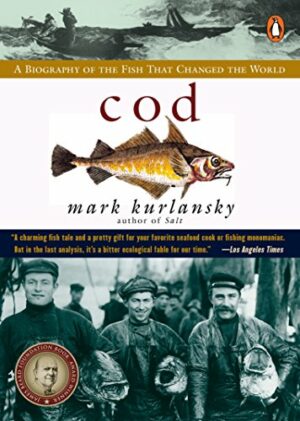 Codby Mark Kurlansky
Codby Mark Kurlansky A history of cod, “the fish that changed the world”.
Not exactly a page-turner, but still interesting.
The Rise & Fall of Cod:
- 1885: “Cod should have lasted forever, and for a very long time it was assumed that it would. As late as 1885, the Canadian Ministry of Agriculture said, ‘Unless the order of nature is overthrown, for centuries to come our fisheries will continue to be fertile.’”
- 1994: “Canadian cod was not yet biologically extinct, but it was commercially extinct—so rare that it could no longer be considered commercially viable. Just three years short of the 500-year anniversary of the reports of Cabot’s men scooping up cod in baskets, it was over. Fishermen had caught them all.”
Fishing Communities:
- “There were no sports for these men to talk about, no high school teams; they aren’t even hockey fans. As children, they went fishing with their fathers every morning just before daybreak.”
- “You buy out a man whose father and grandfather were fishermen, and you are wiping out a hundred years of knowledge. A fisherman is a special person.”
Early Exploration:
- “Until the twentieth-century refrigerator, spoiled food had been a chronic curse and severely limited trade in many products, especially fish.”
- “What did these Norsemen eat on the five expeditions to America between 985 and 1011 that have been recorded in the Icelandic sagas? They were able to travel to all these distant, barren shores because they had learned to preserve codfish by hanging it in the frosty winter air until it lost four-fifths of its weight and became a durable woodlike plank. They could break off pieces and chew them, eating it like hardtack.”
- “The Basques, unlike the Vikings, had salt, and because fish that was salted before drying lasted longer, the Basques could travel even farther than the Vikings.”
The Rise of Cod:
- “For Europeans, the known world doubled in the course of the sixteenth century.”
- “By 1510, salt cod was a staple in Normandy’s busy Rouen market. By midcentury, 60 percent of all fish eaten in Europe was cod, and this percentage would remain stable for the next two centuries.”
- “According to historian Samuel Eliot Morison, at no time in history, not even during World War II, has there ever been such a demand for replacement of sunken ships as between 1530 and 1600. European ambition was simply too far ahead of technology, and until better ships and better navigation were developed, shipwrecks and disappearances were a regular part of this new adventure.”
The American Revolution:
- “By the eighteenth century, cod had lifted New England from a distant colony of starving settlers to an international commercial power.”
- “During the Revolution, the American ability to produce food was the one advantage of the Continental Army. The British Army might have been better trained and more experienced, and it was certainly better dressed and equipped. But the Americans were better fed. They were also better paid, and, thanks to Boston rum, they drank better.”
- “The American Revolution was a remarkably successful revolution. It did not fall into chaos and violence, nor did it slide toward dictatorship. It produced no Napoleon and no institutionalized ruling party. It achieved its goals. It was also, as revolutions go, extremely unromantic. The radicals, the real revolutionaries, were middle-class Massachusetts merchants with commercial interests, and their revolution was about the right to make money.”
New Technology:
- “In midcentury, the steam engine had been invented, but fisheries were slow to seize on this machine. When they did, it would be the first new idea to dramatically change cod fishing since the discovery of North America. Soon there would be another idea: frozen food. Once these two inventions were put together, the entire nature of commercial fishing would change.”
- “[Clarence Birdseye] found that if he froze greens, they would last through the winter without losing their flavor. He filled his baby’s washbasin with salted water, put cabbage in it, and exposed it to Labrador’s arctic wind. The Birdseyes were the first people in Labrador to eat ‘fresh’ vegetables all winter.”
Technology Never Reverses Itself:
- “Once motor ships replaced sail and oar, fishing no longer had to be done with ‘passive gear’—equipment that waited for the fish. Fish could now be pursued. And since a bigger, more powerful engine could always be developed, the scale of the fishing could increase almost limitlessly.”
- “Steam ships with otter trawls were reporting catches more than six times greater than those of sail ships. By the 1890s, fish stocks were already showing signs of depletion in the North Sea, but the primary reaction was not conservation. Instead North Sea fleets traveled farther to richer grounds off of Iceland.”
- “The quality of cured fish was declining because once steam power made faster vessels possible, competitors vied to be the quickest to bring catches to market.”
- “But technology never reverses itself. It creates new technology to confront new sets of problems.”
- “The most important development was that during World War II the three innovations—high-powered ships, dragging nets, and freezing fish—had come together in the huge factory ship.”
The Cod Wars:
- “It was still widely held that the seas had no nationality. The first recognized claim on ocean territory, a three-mile limit in the North Sea, did not come into force until after the Napoleonic wars.”
- “After Iceland’s 200-mile zone gained acceptance in 1976, most nations declared their own 200-mile zones. Some 90 percent of the world’s known fishing grounds fell within 200 miles of the coast of at least one nation. Fishermen now had to work not so much with the laws of nature as the laws of man. Their primary task was no longer to catch as many fish as possible but to catch as many as were allowed.”
- “During the two and a half years of the first Cod War, the Coast Guard managed to arrest only one British trawler out of Grimsby that had ventured within the old four-mile limit where the Royal Navy was not patrolling.”
- “In the second Cod War, a Coast Guard vessel would approach a foreign trawler to inform the captain that he was in violation of Icelandic law and should move outside the fifty-mile limit. If the captain did not agree, the Coast Guard ship would come about and, cruising at a right angle to the trawler, cross its path astern with the Coast Guard’s secret weapon pulled behind—a ‘trawl wire cutter.’ In reality, the new weapon applied the old technology of minesweeping to fishing. One of the device’s four prongs would ensnare a trawl cable and cut it, letting loose a net worth $5,000 and whatever catch might be in it. A trawler without a trawl had nothing to do but go home. During the one-year conflict, eighty-four trawlers—sixty-nine British and fifteen German—lost their nets.”
The Fall of Cod:
- “But while the new, offshore all-Canadian fishery was prospering, the inshore fishermen found their catches dropping off. They suspected the reason was that the offshore draggers were taking so many cod that the fish did not have a chance to migrate inshore to spawn. The inshore fishermen complained to the regulatory agency, the Department of Fisheries and Oceans, but the government had invested in offshore fishing, not inshore, and its political priority was to make its investment a success story.”
- “Catches were increasing not from an abundance of fish but because the efficiency of a modern trawler fleet made it possible to locate the sectors with remaining cod populations and systematically clean them out.”
P.S. Cooking Scientifically:
- “The following recipe is clearly designed with a stove in mind, using several pots and even more than one burner at a time. When stoves replaced hearths, the way people cooked changed.”
- “Fannie Merritt Farmer, an enormously influential cookbook writer, believed in extremely precise instructions and popularized the idea of exact measurements for recipes, an illusion of science that has become standard practice and, for more than 100 years, has left household cooks saying, ‘What went wrong? I followed the recipe.’ She was the most famous director of the Boston Cooking School, founded a generation earlier to teach working-class women how to cook ‘scientifically.’ Influenced by this school, freedom of choice has slowly been exorcised from recipes, and experimenting is increasingly discouraged.”
-
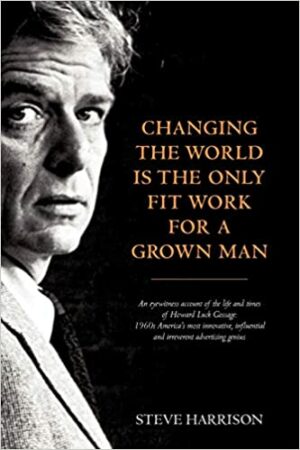 Changing the World Is the Only Fit Work for a Grown Manby Steve Harrison
Changing the World Is the Only Fit Work for a Grown Manby Steve Harrison My favorite adman, Howard Gossage, and his life story.
“His whole life was about finding people and then discovering what it was they wanted to do. And then making it possible for them to do it. That’s what he was about.”
Check out Howard’s ads: howardluckgossage.com
“As to worthy causes, his achievements can be measured in his determination to create something new and daring in the Firehouse on Pacific Avenue… the way he applied feedback and information loops to advertising to create a more humane, involving alternative… how he used both to get to a rudimentary form of interactive and social media… the way they came together in his Grand Canyon campaign, and how that led to the creation of the vast and ever-growing community, the Green Movement… his discovery and promotion of Marshall McLuhan, the man behind the men who brought us Twitter, Facebook and digital utopianism… But let’s stick there on ‘utopianism’. For that is what Gossage ultimately stood for: the betterment of mankind through original thought and sometimes, when necessary, courageous action. That was his worldview, his politics.”
Advertising in the 1950s & ’60s:
- “For the American public, the ‘Fabulous Fifties’ were just that… It was a miracle born of a boom in construction and consumer goods married to cheap credit, and an automobile-driven dash to the suburbs.”
- “For [Gossage] the industry’s claims were bogus. In fact, he likened the true impact of [advertising’s] efforts to ‘a multi-billion dollar sledgehammer driving a 49-cent, economy-size thumbtack.’”
- “His agency never totalled more than 13 people.”
The Well-Written, Audacious Letter:
- “Moreover, it was whilst working on The Kangaroo that Gossage learned the power of the well-written, audacious letter. The publication needed a cover design and, with what would become typical chutzpah, Gossage decided that the best person to provide it would be Walt Disney. The letter went out and, against everyone’s expectation, the movie mogul sent back the drawing, free of charge.”
- “In future, Gossage would write to anyone, regardless of fame or fortune, if and when the mood took him. For example, in 1952, whilst travelling in Europe he wrote to his great hero, Bertrand Russell, and asked if he could visit him in Cambridge. Thereafter, one of his most treasured possessions was a signed and framed typewritten quote from the mathematician and philosopher. A few years later, Gossage also wrote to the Nobel Prize winning novelist John Steinbeck and thus started a long and very close friendship. Finally, as we’ll see in his approach to Marshal McLuhan, if Gossage was particularly inspired to get in touch then the letter would be preceded by a direct ’phone call.”
The Most Unemployable Person I Know:
- “There was good reason for him to be down. He hadn’t had a regular job for nearly three years. He was 36 years of age and struggling to make a home for his second wife while trying to keep up the alimony payments to his first wife and their five year old daughter.”
- “He was kind of lost. He didn’t know exactly what he wanted to do. He wasn’t especially qualified for any particular thing and he knew that. He knew he was very bright in a general sort of way, but how do you apply that to everyday life?”
- “His insistence on trying out new ideas in spite of management’s disapproval made him, in his own words, ‘the most unemployable person I know.’”
- “Given that recruitment profile, the only thing left was to go into business for himself.”
A Different Type of Agency:
- “Up until then agencies had made their money out of ‘the commission system’. This was the 15% rebate they received when booking the space in which their advertising would run… At 15%, even a small agency’s ‘kick-back’, as Gossage derisively called it, could easily be measured in six figure sums.”
- “Gossage was appalled by a situation in which the agency that thrived best was the one which recommended ever higher expenditure on media. As he pointed out, a bad advertisement that ran twenty times earned twenty times more for the agency than a good one that ran once.”
- “Joe Weiner and Howard Gossage broke ranks by insisting their clients buy less advertising not more.”
You Shall Be My Contribution to Culture:
No, there was no standing on ceremony there, for the boss was the most approachable of men. More than that, he took an active interest in his people. For example, decades before it became common practice in more enlightened businesses to develop what might be called a learning culture, he allowed staff members time off for extracurricular studies.
Alice Lowe explains, “I mentioned to Howard one day that I would like to be docent [guide/lecturer] for the multi-billion dollar collection of Asian art which Avery Brundage was donating to the city, but required at least a half-day weekly for training for the next three years. He peered at me through horn-rimmed glasses to see if I was serious. When he saw that I was, he grinned and shook my hand. ‘You shall be my contribution to culture’, he announced grandly. He was pleased I wanted to expand my knowledge of Asian art and culture. With that, he left the office to buy me a book on Chinese art so I could start studying immediately. He gave me complete freedom of time so I could indulge whatever other interest I had at the museum.”
Remaining an Outsider:
- “I write about what interests me and only that. I assume there are others who share my interests.”
- “The ‘loner’ was consciously trying to remain an outsider because, as we’ll see, he felt that was the only way he could discover a more intelligent, responsible way of using advertising as a communication medium.”
- “We don’t know who it was discovered water, but we’re pretty sure it wasn’t a fish.”
- “[The best advertising] will come from men from outside the prevailing environment. They will either come from another culture, another country, or be men who got into the business late in life after doing much else… At any rate, they will do things which seem normal to them, but that seem extraordinarily perceptive to us.”
A New Kind of Advertising:
- “People read what interests them, and sometimes it’s an ad.”
- “We can do one ad at a time. Literally, that’s the way we do it. We do one advertisement and then wait to see what happens; and then we do another advertisement. Oh, sometimes we get way ahead and do three. But when we do, we often have to change the third one before it runs. Because if you put out an advertisement that creates activity, or response, or involves the audience, you will find that something has happened that changes the character of the succeeding ads.”
- “If you say something as interestingly as you can, you can then expect the other party to make a response. So the next time run a new ad; develop the dialog. It makes the conversation much more interesting. And rewarding.”
- “[The agency’s technique] consists of planting an idea through an ad and then waiting to see what happens before doing another ad.”
- “It all sounds very simple but what Gossage was describing in that sentence was an approach to advertising that no one else was to attempt for another 35 years.”
Interactive Advertising:
- “This waiting for feedback put Gossage under extreme pressure… [But he] felt it was worth the effort. To him, advertising wasn’t static, it was dynamic. It wasn’t a statement, it was a dialogue. And it certainly wasn’t to be passively consumed by some distant target audience, it was designed to be acted upon.”
- “He put coupons on all his press ads, even if it wasn’t necessary to have one. He’d put one in that said ‘we’re not expecting you to buy anything, just write to us some time and tell us how things are going’. That was a coupon! And he would spring off of things that people wrote in and write another ad that said ‘Bob from Dallas just wrote to us…’ He would make an ad out of the last thing that happened. It was very interactive and very much like what happens on the internet.”
- “He used the coupon much more than anyone else for this kind of interaction. It wasn’t always to buy something. In fact, it was rarely about buying. It usually had some kind of exchange so the reader would feel they were closer and more engaged with the author.”
Involving the Audience:
- “Let the audience in on the gag. Better still, let them know that you know that they know; this makes it cozier and much more involving. You see, the objective is not fun and games but warmth and community of interest.”
- “I will go further and say that it is not only wrong to attempt to influence an audience without involving it but it is unethical and dishonest.”
The Epitaph He Dreaded:
- “But increasingly, building those commercial communities wasn’t enough for him. As he complained to his wife Sally, ‘I’ll have done nothing that means anything to anyone in this world except maybe invented the Beethoven sweatshirt’ and, as Sally realised, that was an epitaph he dreaded.”
- “When Howard Gossage set up his agency in 1957 he was convinced that the world needed a better kind of advertising. Ten years later, his view had changed. By then, the only advertising that interested him was that which made for a better kind of world.”
- “Gossage believed it was possible to use advertising to create issues and cause discussions. Of course, advertisers do that now but they do it with gigantic amounts of money. He would do it with one insertion and a few dollars, and cause big things to happen.”
- “He was an iconoclast. He said he liked to throw a pebble in the water and see the ripples.”
His Legacy:
- “In the early ’eighties no one knew about Gossage. It was strange. There was a gap in everybody’s memory.”
- “Gossage is the Velvet Underground to Ogilvy’s Beatles and Bernbach’s Stones. Never a household name but, to the cognoscenti, a lot more inspirational and influential.” —Rory Sutherland
- “He believed in people and somehow, through the strength of his conviction, made them believe in themselves and made them willing to strive for difficult goals which they thought unattainable. He made them think and instilled them with the courage to try.”
P.S. More About Gossage
“If you want to read Gossage’s own views on advertising, as encapsulated in his speeches and articles, then Barrows Mussey’s book [Is There Any Hope for Advertising?], and Bruce’s extended appreciation [The Book of Gossage], remain your first ports of call. What I’ve tried to do is explain who Howard Luck Gossage was, what he did and why he did it, using the testimony of those who knew, lived and worked with him. I hope I’ve done justice to them—and him.”
-
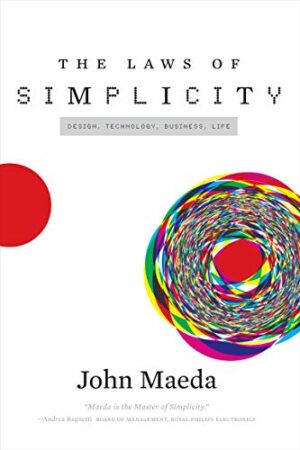 The Laws of Simplicityby John Maeda
The Laws of Simplicityby John Maeda A simple book on simplicity—a framework.
“Simplicity is about subtracting the obvious and adding the meaningful.”
Ten Laws:
- Basic Simplicity
- Reduce: The simplest way to achieve simplicity is through thoughtful reduction.
- Organize: Organization can make a system of many appear fewer.
- Time: Savings in time feel like simplicity.
- Intermediate Simplicity
- Learn: Knowledge makes everything simpler.
- Differences: Simplicity and complexity need each other.
- Context: What lies in the periphery of simplicity is definitely not peripheral. (Nothing is something. Ambience is everywhere.)
- Deep Simplicity
- Emotion: More emotions are better than less.*
- Trust: In simplicity we trust. (Lean back. Just undo it.)
- Failure: Some things can never be made simple.
*“The seventh Law is not for everyone…” Form follows function. Feeling follows form. This requires complexity.
Three Keys:
- Away: More appears like less by simply moving it far, far away.
- Open: Openness simplifies complexity.
- Power: Use less, gain more.
SHE:
What to do when everything that can be removed is gone.
- Shrink
- Hide
- Embody (Quality)
SLIP:
A method for organizing. “What goes with what?”
- Sort
- Label
- Integrate
- Prioritize
BRAIN:
A process for learning/teaching.
- Basics are the beginning.
- Repeat yourself often.
- Avoid creating desperation.
- Inspire with examples.
- Never forget to repeat yourself.
Also, Relate-Translate-Surprise.
Tradeoffs:
- “How simple can you make it?” vs “How complex does it have to be?”
- “How can you make the wait shorter?” vs “How can you make the wait more tolerable?”
- “How directed can I stand to feel?” vs “How directionless can I afford to be?”
- “How much do you need to know about a system?” vs “How much does the system know about you?”
For more, see lawsofsimplicity.com.
- Basic Simplicity
-
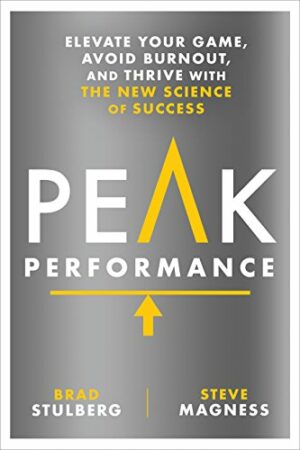 Peak Performanceby Brad Stulberg
Peak Performanceby Brad Stulberg Self-help book on human performance.
As much as I’d like to pretend like I’m better than this book, I can’t help think of the biblical story of Naaman, who got angry at the prophet Elisha for giving him such simple advice:
“Sir, if the prophet had told you to do something very difficult, wouldn’t you have done it? So you should certainly obey him when he says simply, ‘Go and wash and be cured!’” —2 Kings 5:13
The advice in this book is equally simple:
“Systematically grow by alternating between stress and rest.”
Burnout:
- “BIGGER, FASTER, STRONGER—BUT AT WHAT COST?”
- “Ask those who knew him and a single descriptor invariably came to mind: obsessive. It was the only word that fit.”
- “Both runner and consultant shined extremely bright, only to see their performance plateau, their health suffer, and their satisfaction wane.”
Stress + Rest = Growth:
- “Whether someone is trying to qualify for the Olympics, break ground in mathematical theory, or craft an artistic masterpiece, many of the principles underlying healthy, sustainable success are the same.”
- “The key to strengthening your biceps—and, as we’ll learn, any muscle, be it physical, cognitive, or emotional—is balancing the right amount of stress with the right amount of rest. Stress + rest = growth. This equation holds true regardless of what it is that you are trying to grow.”
- “In the world of exercise science, this cycle of stress and rest is often referred to as periodization.”
Physical Cycle:
“During a workout you’re breaking down soft tissue and really stressing your body. How you treat yourself in between workouts is where you make gains and acquire the strength to attack the next one.”
- Isolate the muscle or capability you want to grow.
- Stress it.
- Rest and recover, allowing for adaptation to occur.
- Repeat—this time stressing the muscle or capability a bit more than you did the last time.
Creative Cycle:
“The brightest minds spend their time either pursuing an activity with ferocious intensity, or engaging in complete restoration and recovery.”
- Immersion: Total engagement in their work with deep, unremitting focus.
- Incubation: A period of rest and recovery when they are not at all thinking about their work.
- Insight: The occurrence of “aha” or “eureka” moments—the emergence of new ideas and growth in their thinking.
Skills Come From Struggle:
- “Regardless of the tutorial explanations employed, when students were not at an impasse, learning was uncommon.”
- “The most effective tutoring systems, on the other hand, all shared one thing: They delayed instruction until students reached the point of failure. Growth comes at the point of resistance. Skills come from struggle.”
- “Drilling specific, testable facts in preparation for rigid, standardized tests doesn’t promote learning. Rather, science shows that learning demands open-ended exploration that allows students to reach beyond their individual limits.”
- “Students who were forced to struggle on complex problems before receiving help from teachers outperformed students who received immediate assistance. The authors of these studies summarized their findings in a simple yet elegant statement: Skills come from struggle.”
Experience vs Deliberate Practice:
- “It isn’t experience that sets top performers apart but the amount of deliberate practice they put in… Expertise is not about a certain number of hours practiced. Rather, it’s about the type of work that fills those hours. Practice doesn’t make perfect. Perfect practice makes perfect.”
- “They focused carefully on improving specific parts of their performance—even if that made the session less enjoyable.”
- “What really differentiates deliberate practice is deep concentration.”
- “The number of years a psychologist had under his belt, for example, had no correlation to how successful he was at treating patients. Other research showed that many physicians actually got worse at making diagnoses from radiographic scans as they gained more experience. The more time that passed since their formal training, the more errors they made.”
Single-Tasking:
- “‘Do only one thing at a time.’ Dr. Bob’s secret to doing so much is doing so little. He is the ultimate single-tasker.”
- “Just imagine if a runner doing intervals on the track came to a complete stop to check her phone after each and every notification. The constant start-and-stop would certainly impair her performance.”
- “Researchers at the University of Michigan found that seemingly innocuous multitasking can cannibalize as much as 40 percent of someone’s productive time. Although it may feel like we are getting twice as much done when multitasking, we’re actually getting close to half as much done.”
Deep Work:
- “By working smart—that is to say, alternating between blocks of hard work followed by short breaks—we get the most out of ourselves and avoid crippling fatigue and burnout.”
- “In his years of studying experts, Ericsson found that top performers across all fields are unable to sustain intense work and deep concentration for more than 2 hours. Outside of rare, short-term situations, once this threshold is passed, neither the body nor the mind can sustain the workload. Great performers, Ericsson found, generally work in chunks of 60 to 90 minutes separated by short breaks.”
- “If you find yourself struggling to maintain full attention (e.g., checking your smartphone for notifications, pulling up your email browser, mind-wandering), start with small chunks of 10 to 15 minutes and gradually increase the duration every week. No different from any other skill, deep work is a practice that must be cultivated over time.”
Daily Walks:
- “The magic of generating creative ideas lies in stepping away from effortful thinking.”
- “Many esteemed philosophers, from Kierkegaard to Thoreau, held their daily walk as something sacred, the key to generating new ideas. ‘Methinks that the moment my legs begin to move, my thoughts begin to flow,’ Thoreau famously penned in his journal.”
- “A good idea doesn’t come when you’re doing a million things. The good idea comes in the moment of rest. It comes in the shower. It comes when you’re doodling or playing trains with your son. It’s when your mind is on the other side of things.”
- “Walking occupies us just enough to help us stop thinking about whatever it is we were working on, but not too much as to prevent mind-wandering.”
Sleep:
- “Sleep is one of the most productive things we can do. We don’t grow when we’re in the gym or when we’re immersed in our work: We grow in our sleep.”
- “One of sleep’s foremost benefits is the role it plays in how we consolidate and store—that is, how we remember—new information.”
- “REM time increases with each sleep cycle. In other words, there are increasing marginal returns to sleep. Hours 7 to 9—the hours that the majority of us never get—are actually the most powerful.”
- “Hard work only becomes smart and sustainable work when it’s supported by rest.”
Routines:
- “Billingslea discovered that elevating his heart rate and loosening up his body prior to a show is far more important than warming up the technical aspects of drumming itself.”
- “Don’t wait for the muse… Your job is to make sure the muse knows where you are going to be every day from nine ’til noon or seven ’till three. If he knows… I assure you he’ll start showing up.” —Stephen King
- “If stress + rest = growth is the foundation upon which our talent is built, then our routines and environments help us to fully express that talent.”
- “Some, including Mozart, did their best work late into the night. Others, including Beethoven, were most productive at the crack of dawn… Rather, each individual figured out when they were most alert and focused, and designed their day accordingly.”
- “Great performers don’t fight their body’s natural rhythm; rather, they take advantage of it.”
The Company You Keep:
- “We are wired for empathy.” —Emma Seppälä
- “It’s as if your own attitude pales in comparison to the attitudes of those around you.”
- “Researchers found that while there was variability in fitness gains/losses across all the cadets, there was hardly any variability within squadrons… It turns out the determining factor as to whether the 30 cadets within a squadron improved was the motivation of the least fit person in the group.”
- “While what you do and when you do it is important, so is who you do it with.”
Consistency:
- “Perhaps the real secret of world-class performers is not the daily routines that they develop, but that they stick to them.”
- “The best performers are not consistently great, but they are great at being consistent.”
Purpose:
- “They were able to endure the pain, to say ‘more’ when their bodies were screaming ‘less,’ because they were supremely motivated by a self-transcending purpose.”
- “Purpose fosters motivation; motivation lets us endure a greater perception of effort; and enduring a greater perception of effort often results in better performance.”
- “The true meaning of life is to be discovered in the world rather than within man or his own psyche.” —Victor Frankl
-
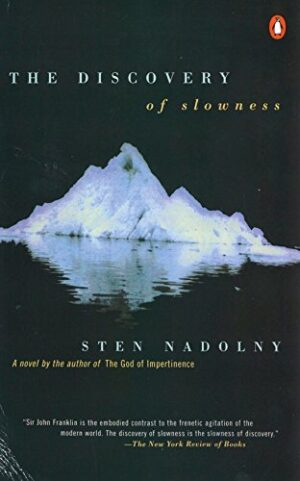 The Discovery of Slownessby Sten Nadolny
The Discovery of Slownessby Sten Nadolny Reimagining the life of Sir John Franklin, Arctic explorer.
Deeply rewarding. Easily one of my favorite books this year.
Keeping Pace in a Fast World:
- “He knew: he couldn’t catch the ball if he followed it but only if he lay in wait for it.”
- “Climbing didn’t make him faster; he knew that by now. But that didn’t make the tree useless. As he moved from branch to branch he found that coherent thought was better there than on even ground. When he had to breathe heavily he perceived the order of things.”
Speaking Sensibly:
- “Listening to Aunt Eliza, one could learn that when people talk too fast the content becomes as superfluous as the speed.”
- “[Matthew] spoke sensibly, with pauses.”
Going to Sea:
- “John watched the work on the ship very closely. He let himself be taught how to tie knots. He noted a difference: in training, the name of the game was how fast one could get the knot tied; in real situations, how firmly it held. John watched the sails closely to see which maneuvers actually required speed. In turning, it was clear: the ship’s loss of momentum was greater the longer its sails stood against the wind, and so work on the braces had to be fast. There were more such situations. John decided to memorize them in the course of time, like the tree from below.”
- “What his eyes or ears couldn’t manage, his head did during the night. Intellectual drill balanced out slowness.”
- “What was needed in action was unreflective knowledge instilled by practice—the blindness.”
- “John also learned from him that every ship had a maximum speed that it could not exceed even with the most favorable wind, even if it were equipped with a thousand sails.”
Finding His Rhythm:
- “‘Faster, Mr. Franklin. What’s there to think about? You were there, weren’t you?’ For that, too, John was prepared. ‘When I tell something, sir, I use my own rhythm.’”
- “Every ship’s hull has its own maximum speed, which it can never exceed no matter what the rig or the wind velocity. And so it is also with me.”
- “All at once John was strong enough to bear the impatience of others, and with that the game was at an end. He moved at his own pace. He gave orders the way a carpenter drives nails, each straight and deep until it held. He paused where he wanted to, and not where others interrupted him. He renounced the fixed look and the snarl even when things got tight.”
- “Slowness became honorable; speed became the servant.”
History:
- “What was truly significant was not immediately apparent. It’s an element that is always present, an element not perceived the way a painter sees things but known by logical reflection: without patience no trade could be trade. Without patience, merchants were just robbers. Patience functioned like the escapement in a clockwork.”
- “In the study of history, slowness is an advantage. The scholar decelerates the fast-moving events of past days until his mind can fathom them. Then, however, he can demonstrate to the rashest king how he should have acted in battle.”
London:
- “All of London seemed to be in love with speed.”
- “The clock faces in London were white these days. And many clocks now had second hands; only ships’ chronometers had used them before. Clocks and people had become more precise. John would have welcomed this if the result had been greater calm and deliberation, but instead he observed everywhere only time pressure and haste.”
- “Reaching for one’s watch chain had become a more frequent move than reaching for one’s hat. One hardly heard curses anymore; the exclamation ‘No time!’ had taken their place.”
- “London in the summer of 1846 churned up so many new events that news from the Arctic would have hardly made an impression.”
Captain Franklin:
- “I take my time before I make mistakes.”
- “If a man was slow he could accomplish a great deal, but he had to have good friends.”
- “He depended on others and carefully selected whom to rely on for what occasion.”
- “If a slow person, against all predictions, had managed to survive in a fast profession, that was better than anything else.”
- “Strength can also be something other than mere speed.”
- “[George Back] was a giant of ambition, but when there were delays he was a dwarf about time.”
- “John put it out of his mind. It was better not to understand Back at all than to misunderstand him.”
- “Confusion was more dangerous than any emergency, and the captain’s confusion was the most dangerous kind. They all learned that.”
Surviving the Arctic:
- “At night it took more than an hour before the stiffly frozen blankets became warm enough to allow anything like sleep. They stuffed their boots under their bodies so they would not have to thaw them out in the morning. To do that would require a fire and therefore a search for wood.”
- “No supplies, not a bite of food! They had scraped off the top of a reindeer blanket that had been discarded half a year ago with their knives and had consumed the shoes they had worn to get there.”
- “At first the Indians refused to enter the hut because corpses were lying there. They said whoever does not bury the dead is dead himself and needed no help.”
Discovering vs Improving:
- “‘The meaning of creation is not known to man,’ answered the teacher. ‘Besides, a good story doesn’t need a purpose.’”
- “Mankind will learn… It learns a little more slowly than He had assumed. ‘That’s because the most competent among them will always try to change that small part of the world which they know. One of these days they’ll discover the world instead of improving it, and not forget what they already discovered.’”
Making Time for Slowness:
- “Life passed by only too quickly. Their circle of friends was enormous and brought them more obligations than pleasure.”
- “Too many different points one after the other destroyed concentration.”
- “He needed to create reserved space for himself in which he could protect his time… Whatever the pressures, tea time needed to be kept.”
- “We’re in agreement about the school. Learning and seeing are more important than education.”
- “Bad schools… keep everyone from seeing more than the teacher.”
- “People have to see for themselves how long things last and how quickly they change.”
- “Your machine can’t be amazed and can’t be confused; so it can’t discover anything alien to itself.”
- “Stronger than all predictions are coincidence and contradiction.”
- “Without slowness nothing can be done, not even a revolution.”
Music
-
 v2.0 (Deluxe Edition)by GoGo Penguin
v2.0 (Deluxe Edition)by GoGo Penguin Breakbeat jazz. Raw.
-
 Havasuby Pedro The Lion
Havasuby Pedro The Lion Slow and steady nostalgia.
-
 Cleanseby Joywave
Cleanseby Joywave Flawless indietronica. On loop.
-
 The Dreamby alt-J
The Dreamby alt-J Witchy grooves. Follow with An Awesome Wave.
-
 Dance Fever (Deluxe)by Florence + The Machine
Dance Fever (Deluxe)by Florence + The Machine She’s back. Free.
-
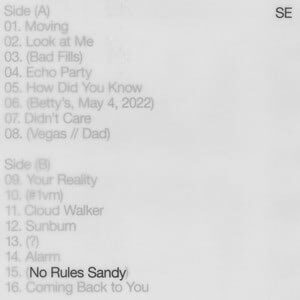 No Rules Sandyby Sylvan Esso
No Rules Sandyby Sylvan Esso Chaos. Beautiful.
-
 ERRA (Instrumental)by ERRA
ERRA (Instrumental)by ERRA Blistering. Meticulous.
-
 Phantom Anthemby August Burns Red
Phantom Anthemby August Burns Red New favorite metal album. The Frost.
-
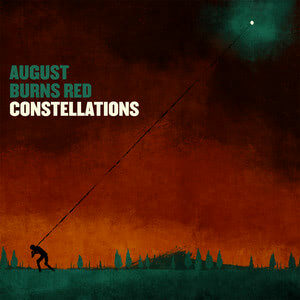 Constellationsby August Burns Red
Constellationsby August Burns Red Solid. Heavy. Powerful.
-
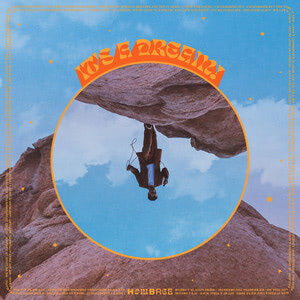 It’s a Dream!by Hembree
It’s a Dream!by Hembree Reach Out, ’nuf said.
-
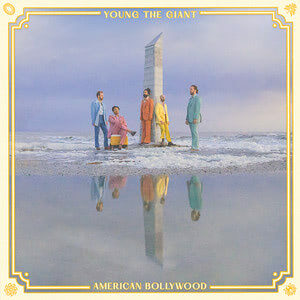 American Bollywoodby Young the Giant
American Bollywoodby Young the Giant Hypnotic. A journey.
Code
I didn’t do a lot of CodePens this year—at least, not a lot of “interesting” ones.
Most of my pens were just scratch pads for teaching basic concepts (e.g., a lot of JavaScript demos showing how this works) or else they were rough prototypes for internal projects. I also did a lot of LeetCode practice on the side—algorithms are fuuun.
So here’s my collection of code stuff I did this year.
- ⚙️ Basic :has Examples
- 👥 Previous Sibling Selector With :has()
- 🕹 Growing Button with clip-path
- Web Components:
- Web Components – Hello World
- Web Components – Templates
- Web Components – Slots and Shadow DOM
- Web Components – Named Slots, Style Overrides, and Parts
- Web Components – Custom Properties (Not Attributes)
- Web Components – Custom Properties and Attributes
- 💡 Prototype: Adaptive Web Component
- 💡 Prototype: Test Modifying Web Component Templates
- 🧠 Reset CSS for Web Components
- 💡 Prototype: Alpine.js multi-step form with reorderable questions
- 💡 Prototype: Alpine.js + XState multi-step form with reorderable questions
- Snap Slider:
- 📚 How to destructure function parameters
- 📚 How to destructure array values into object properties
- 🔀 “Swappable” React Components
- 🦈 Kids: Shark Chomp
Public PRs:
